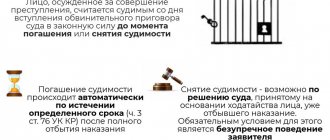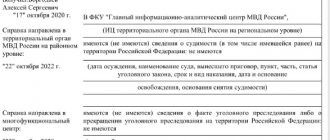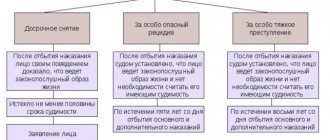My brother is going to get a serious job. This is one of the large enterprises in our city, and the requirements for potential employees are quite serious. There's a problem. My brother had problems with the law for hooliganism. The deadline established by law for the removal and complete annulment of a criminal record has not yet expired, but he fully admitted his guilt and repented of his offense.
We needed to take care of the process of expunging a criminal record before the deadline. This article is dedicated to this topic. Here you will find answers to the following questions:
- Grounds for annulling a criminal record;
- Legal reasons;
- Features of an expunged criminal record;
- The procedure for carrying out the procedure;
- Rules for drawing up a petition.
Grounds and reasons for getting rid of a criminal record
The removal of previously assigned criminal records from convicted persons is provided for by the rules of modern legislation and must be carried out within a strictly established time frame. This condition is stated in Art. 86 of the Criminal Code of the Russian Federation.
But there are certain situations when a criminal record can be expunged before the end of the term. In such a situation, you need to write an appropriate petition.
Early expungement of a criminal record is permitted in the following situations:
- The punished person has already served the prescribed sentence, but the convicted conviction erroneously turned out to be outstanding;
- The citizen has an exceptionally positive character, both at home and at work;
- The accused has not previously been found to have committed any other violations, and at work he fulfills his duties conscientiously and without any criticism;
- The requirements and obligations imposed by the court have been fulfilled;
- The person visits the penitentiary inspectorate within the specified time frame;
- The citizen admitted his guilt and completely repents of his offense.
Removal and expungement of a criminal record: what are the differences?
A criminal record is defined as a special legal position of a citizen in relation to the state, which lasts from the moment the court sentence is confirmed until it is withdrawn or expunged.
There is a significant difference between these two concepts because:
- Repayment occurs on the day when the specified period expires. It is counted from the date of release (including early release), and ends after several months/years in accordance with the Criminal Code. Repayment is carried out “automatically”, since no additional judgment needs to be made.
- Withdrawal occurs before this deadline. This happens on the basis that the person has proven the fact of his correction by impeccable behavior. There are other reasons for early withdrawal. This could be a presidential pardon or an amnesty that the State Duma can hold. In such cases, withdrawal is also carried out “automatically”, without going to court.
Thus, repayment occurs on time, and withdrawal occurs ahead of schedule in accordance with the specified circumstances. Moreover, both expungement and expungement mean the complete cessation of a criminal record, which “nullifies” all legal consequences (more severe punishment, serving it in a maximum security colony if the act is repeated, etc.). This means that from the point of view of the law, the facts of criminal prosecution and conviction, serving a sentence are “forgotten”, i.e. such a citizen is perceived like any other person.
However, the consequences of a criminal record can actually last a lifetime in social relationships. For example, a person (depending on the specific article) cannot:
- engage in certain activities;
- undergo military service;
- buy, transport, store weapons;
- cannot adopt a child;
- cannot get a large loan from a bank.
Certain consequences may also apply to family members of the convicted person. This is expressed in the fact that they cannot engage in certain work or study in certain educational institutions (Academy of the Ministry of Internal Affairs, Academy of Foreign Intelligence, etc.). However, here too the situation is ambiguous, since ultimately everything is determined by the article and the presence/absence of relapses.
Based on this, the differences between withdrawal and repayment can be presented in the following table.
| comparison sign | repayment | withdrawal |
| justification | expiration of the deadlines provided for by the Criminal Code | judgment or act of amnesty or pardon |
| deadlines | registered in the Criminal Code (from 0 to 10 years) | not installed |
| legal consequences | none: expungement or expungement means the complete cessation of a criminal record; this factor is not taken into account when assigning new punishments | |
| social consequences | more often present for a long period of time - inability to get a certain job, serve under a contract, and much more | |
Legal reasons
Criminal record requirements are strictly regulated by modern law. Here are the most basic provisions:
- The determination of the official status of a criminal record and the time period when full repayment occurs are prescribed in Art. 86 of the Criminal Code of the Russian Federation.
- In case of parole, revocation is established under Art. 79 of the Criminal Code of the Russian Federation.
- The process of filing and subsequent consideration of an official petition for the annulment of a criminal record is strictly regulated by Art. 400 Code of Criminal Procedure of the Russian Federation.
When is a criminal record expunged?
A criminal record is considered completely expunged if the period established by official legislation has fully expired.
Moreover, for each type of crime committed it is different:
- The punishment is suspended - immediately after the end of the required probationary period.
- The sentence was sentenced to imprisonment for a year after the punishment.
- Committing minor crimes and violations of moderate category – three years.
- Serious crime - from 8 years.
- Especially severe - from 10 years.
To calculate the prescribed period, the exact punishment specified in the court verdict is taken.
Legislative restrictions on hiring with a criminal record
Persons with a criminal record are not allowed to work (serve), in particular:
- in the field of pedagogy, upbringing and education (Article 331 of the Labor Code of the Russian Federation);
- in the field of child and youth development and sports (Article 351.1 of the Labor Code of the Russian Federation);
- in the field of medical care and social protection of children (Article 351.1 of the Labor Code of the Russian Federation);
- in the field of culture and art with the participation of children (Article 351.1 of the Labor Code of the Russian Federation);
- in the internal affairs bodies of the Russian Federation (Article 14 of the Law “On Service in the Internal Affairs Bodies” dated November 30, 2011 No. 342-FZ);
- in the FSB of the Russian Federation (Article 16 of the Law “On the FSB” dated 04/03/1995 No. 40-FZ);
- in the Federal Drug Control Service of the Russian Federation (the restriction is contained in instructions for admission to service);
- in customs authorities (Article 7 of the Law “On Service in Customs Authorities” dated July 21, 1997 No. 114-FZ);
- in the judicial authorities (Article 4 of the Law “On the Status of Judges in the Russian Federation” of the Russian Federation dated June 26, 1992 No. 3132-1.);
- “On the prosecutor’s office (Article 40.1 of the Law “On the Prosecutor’s Office” dated January 17, 1992 No. 2202-1);
- in aviation (clause 3 of article 52 of the Air Code of the Russian Federation);
- in the field of clearing (Article 6 of the Law “On Clearing” dated 02/07/2011 No. 7-FZ);
- in ensuring the safety of the fuel and energy complex, transport security (requirements are established by the relevant federal laws).
It should also be borne in mind the effect of the norm common to all government departments established by sub. 2 p. 1 art. 16 of the Law of July 27, 2004 No. 79-FZ. According to this norm, a person cannot be accepted into the civil service (be in the civil service) if he is sentenced to a punishment that excludes the possibility of performing duties in a civil service position, or if he has a criminal record that has not been expunged or expunged.
Time to submit an application
The document is allowed to be sent to court if exactly half of the established period has passed since the prescribed punishment. In other words, the following periods are taken into account:
- A suspended sentence is exactly half of the probationary period awarded.
- Punishment without the need to deprive of liberty - after six months.
- Sanctions for violations that fall into the category of minor and moderate severity can be filed after 1.5 years.
- Punishment for serious violations of the law is after 4 years.
- The sentence imposed for a particularly serious crime is 5 years.
If a citizen has filed an official petition to expunge his criminal record, he gets rid of the status of a previously convicted person from that time.
Calculation of the period for expiration of a criminal record
The expungement of a criminal record occurs after the following period:
- Expiration of the probationary period. Applies only to probationers.
- Expiration of one year. This period is intended for persons for whom imprisonment as a punishment is not assigned, and begins to be calculated from the moment the sentence is executed or served.
- Expiration of three years. Applies to persons with a criminal record for crimes of moderate and minor gravity. These include acts enshrined in the criminal code, the maximum punishment for which is three and five years in prison, respectively.
- The moment the calculation of the term begins is the full completion of the sentence.
- The expiration of eight years. This term is calculated from the moment the sentence is served and is established for those sentenced to imprisonment for a crime, the maximum punishment for which is determined from five to ten years of imprisonment.
- Expiration of ten years. This period is established for persons found guilty of committing an act prohibited by an article of the Criminal Code of the Russian Federation, which provides for a minimum penalty of ten years in prison.
If the court imposes an additional punishment, the period for expunging the criminal record begins to be calculated only from the moment the additional punishment expires.
Features of expunging a criminal record
The operation to remove an assigned criminal record is as follows:
- The court listens carefully to the applicant's demands and explanations.
- The evidence presented is attached to the case under consideration.
- Materials are examined that prove that the person has reformed.
- If a prosecutor takes part in the proceedings, the court will definitely hear his opinion.
- Explanations and statements of other participants in the case are heard.
- A single decision is made.
- An appropriate official decision is issued.
Rules for drawing up a petition
A petition to expunge a criminal record must be drawn up in accordance with established rules. There is no strictly unified form, but it is important to adhere to a certain structure. The document must consist of a standard header and body. The second is divided into a operative part and a more important descriptive one.
Header design rules
In this part, at the top right you should write down the name of the court and the full name of the judge. This must be the organization to which the application is being submitted.
After writing this information, the name is written - Petition to expunge a criminal record. Next, fill out the main part.
Filling the main part
When compiling a descriptive part, you should adhere to the following rules for sequential filling:
- This part of the petition begins with a detailed statement of the essence. It should describe where and when the applicant served his sentence.
- Facts are prescribed that can officially be regarded as reasons for exemption from criminal record status. This includes entering into an official marriage, good legal and legal adaptation, having official employment and children.
- You can write that having a criminal record prevents you from living a normal life and does not allow you to get a good job.
- The next point is to indicate the relevant legislative act.
Next is the operative part. Here a request is formulated - to quash a criminal record based on a previously issued sentence. It is necessary to list documents confirming the veracity of the given facts. This may include:
- Characteristics obtained from the place of work;
- Extracts from salary slips on profit accrual;
- Orders for monetary incentives and so on.
The document ends with the signature and date of the applicant.
You can submit a document in different ways:
- By post.
- By email.
- Personal visit to court.
The petition should be sent to the court that is located at the place of residence or for consideration by the magistrate who deals with criminal cases.
Assistance in expunging a criminal record early in Yekaterinburg
Clearing a criminal record through the court is possible; cases of filing this application are not uncommon for judges, and a positive decision depends on preparation for the process, building a position before the court and collecting all the necessary documents - you can find out more by consulting our lawyer who deals with criminal cases.
Important: if the court refuses to expunge your criminal record, you can always appeal the decision with our help; our lawyers often deal with the issue of appealing the court verdict, and therefore, the accumulated experience will help in carrying out this appeal.
Evidence and documentary base
In order for a criminal record to be expunged earlier, a person must take care of collecting and providing a certain evidence base.
Papers that can be regarded as grounds for the complete legal annulment of a criminal record include:
- Various medical certificates;
- A paper from the district police officer about behavioral characteristics;
- Positive reference from the place of work;
- A certificate confirming that the applicant was not brought to new responsibility after serving his sentence;
- Testimony from relatives, neighbors and colleagues living in the house.
All these are additional supporting certificates that are attached to the main ones. The list may be supplemented with other documents at the discretion of the court.
Among the required papers and certificates are:
- Judgment;
- Characteristics taken at the applicant’s place of employment;
- Certificate of serving the sentence;
- Papers proving that the damage caused by the violation was fully compensated.
How to expunge a criminal record through court
Regulates the removal of a criminal record through the court, Art. 400 of the Criminal Procedure Code of the Russian Federation. Consideration of this issue is carried out in court depending on the place of residence of the convicted person. The presence of the convicted person is mandatory - if he does not appear, the court will not consider the petition to remove the criminal record. The prosecutor has the right to be present at this trial, but his presence is not mandatory. There must be a criminal-executive inspection, which supervises the convicted person after serving his sentence. The issue of expunging a criminal record will be resolved by a court or a magistrate.
The judicial procedure for expunging a criminal record involves the following stages:
- hearing by the court of oral explanations given by the convicted person who filed the petition;
- inclusion of evidence provided by the convicted person to the case materials;
- research of materials indicating the correction of the convicted person;
- hearing the prosecutor’s position on this issue if he participates in the meeting;
- hearing explanations from others;
- making a decision by the court;
- issuing a corresponding decision.
The decision to remove a criminal record is made by the judge alone.
If the court makes a positive decision based on the results of consideration of the petition, then the corresponding decision will be sent to the authorities of the Penitentiary Inspectorate, which supervised the convicted person.
If the court refuses to satisfy the petition, it can be re-submitted immediately before the court that refused to satisfy it, after 1 year from the refusal.
If you apply ahead of time, your application will be denied.
During the court hearing, the responsibility to prove the existence of grounds for expunging a criminal record lies directly with the convicted person. Such evidence may include:
- certificates that confirm that the convicted person was not brought to criminal, administrative or other liability after being released from the place of serving his sentence;
- positive characteristics from places of work, study, and other organizations;
- oral or written testimony of neighbors, employees, relatives and other persons who encountered the convicted person in the course of work, study, at home, etc. (the explanations of these persons will not constitute testimony, but will be heard, taken into account, and entered into protocol and will definitely influence the court’s decision);
- information from the district police officer about the behavior of the convicted person;
- characteristics of the organs of the correctional institution;
- medical documents.
Important! If the conviction is overturned by the court, this will return a number of constitutional rights to the convicted person, but information about criminal prosecution will remain in the Internal Affairs Directorate Information Center.
Refusal to satisfy the application
There are several situations in which the described request will be refused:
- The application was submitted at a time that does not correspond to that specified in the law.
- The document contains errors or inaccuracies in information.
- Throughout the entire probationary period, certain legal violations were committed.
- The information in the petition is unclear and there is a complete absence of supporting documents.
If the decision is not made in favor of the applicant, the period of criminal record automatically remains the same. It is only possible to submit a new application after one year.
An expunged criminal record is a 100% guarantee that a person will be given back all their constitutional rights.
It must be remembered that information about previously incurred criminal punishment will still be stored in the Internal Affairs Directorate.
What is indicated in the certificate?
The certificate stating that the criminal record has been expunged shall indicate the following:
- the applicant’s passport details, place of residence;
- name of the authority that issued the document;
- The applicant's full name and date of birth;
- the presence or absence of criminal punishment, when and under what article he was convicted, for what period;
- date and signature of the person who issued the certificate.
Even if the criminal record was cleared a long time ago, the employee who issues the certificate must indicate this. Concealing this information is a malfeasance.








